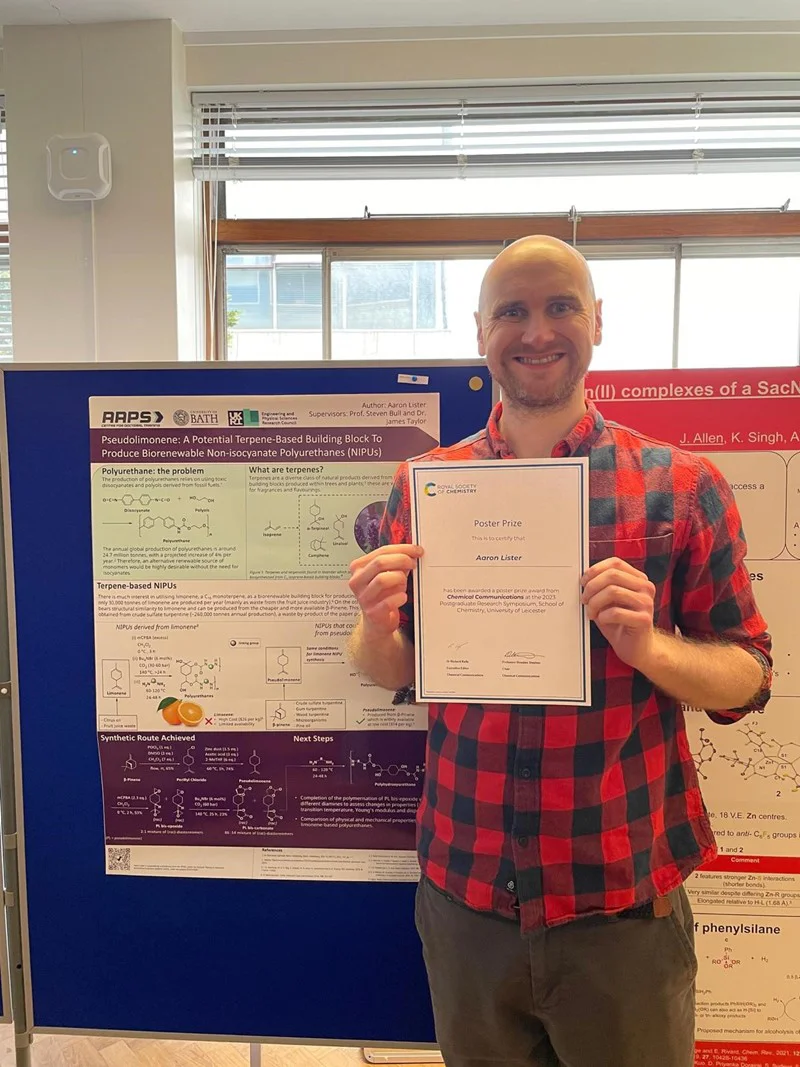Innovations in Chemistry: Reflections on the University of Leicester School of Chemistry Postgraduate Symposium 2023
Posted by: Dr Aaron Lister
On the 28th of June 2023, I had the pleasure of presenting a poster in the University of Leicester Chemistry Postgraduate Symposium. The symposium was a captivating journey into the diverse realms of chemistry, ranging from pharmaceutical advancements to unravelling the mysteries of interstellar space. In this blog, I'll provide a glimpse into the symposium's topics and share my research involving terpenes, biorenewable molecules, and their potential application in the automotive industry.
A Tapestry of Scientific Exploration
The symposium was a rich tapestry of innovative research presentations, each highlighting the remarkable advancements in various niches of chemistry. Postgraduate students from the University of Leicester host this annual symposium and involves research conducted by PhD students from different universities and industries across the country. Topics spanned a wide spectrum, from revolutionizing pharmaceutical chemistry to exploring the cosmos through ion spectroscopy. It was a testament to the depth and breadth of chemistry's impact on our lives and the world around us.
Innovative Research: Pseudolimonene for Non-Toxic Polyurethanes
I presented a poster at the symposium that focused on my research which involves utilizing a chemical species called pseudolimonene, a terpene found in various citrus fruits, as a potential biorenewable building block for producing environmentally friendly polyurethanes. These versatile plastics find applications in various automotive components, including seats, interior trim, insulation, and bumpers. However, the production process of conventional polyurethanes often involves the use of chemicals that are toxic and are also derived from fossil oil.
OK, so what are terpenes? Terpenes are natural compounds commonly found in plants and offer a promising alternative to the conventional ingredients used in polyurethane production. Terpenes are responsible for the distinctive scents of many plants and have a wide range of applications, from flavour and fragrance Industries. For instance, certain terpenes are abundantly found in shower gels, such as linalool and geraniol which harbour a scent of lavender and roses (check the bottle if you wish!). However, there is much interest in their potential use as biofuels and biomaterials. Sugar-based sources, such as corn and sugarcane, have garnered much attention as a source for producing biorenewable fuels and materials. However, these resources are vital for food production and could bring ramifications such as land change use and spike in food costs. However, terpenes are massively abundant and are non-competitive with food crop production, not to mention having a close relationship with crude oil molecularly speaking, so theoretically could be used within existing oil refineries with little modification.
My research focuses on using Pseudolimonene as a building block to produce biorenewable polyurethanes and these terpenes can be produced from cheap and abundant monoterpenes sourced from industrial waste, such as the paper pulping industry, in which 260 000 tonnes are produced annually. These biorenewable sources could reduce our reliance on non-renewable resources and contribute to a greener future.
I'm thrilled to share that my poster presentation was honoured with a prize, an acknowledgment of the potential impact of terpenes and their role in sustainable chemistry and its potential applications in the automotive sector. This recognition reinforces the importance of exploring alternatives to harmful chemical processes, and it motivates me to continue my journey towards environmentally conscious innovations.
Future work will focus not only using pseudolimonene for producing bio-renewable polyurethanes. I aim to investigate the utilisation of terpenes from industrial waste for producing a biorenewable source of hydrogen carriers, which could be cheaper and safer to store than high-pressured hydrogen gas. It is exciting to think that this research could well influence how we store hydrogen in our future cars, busses and trucks.
